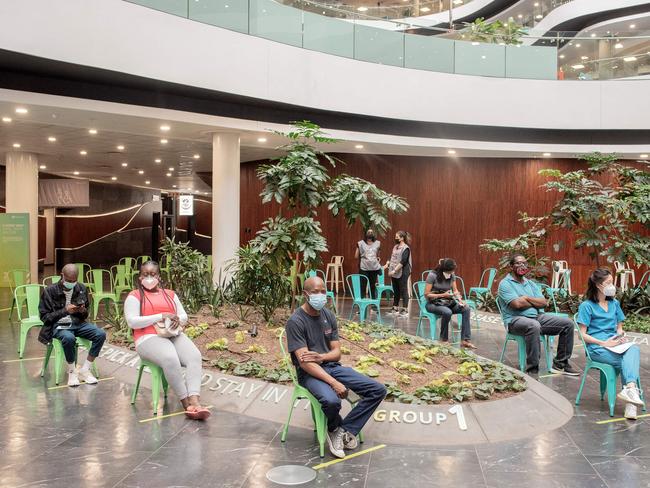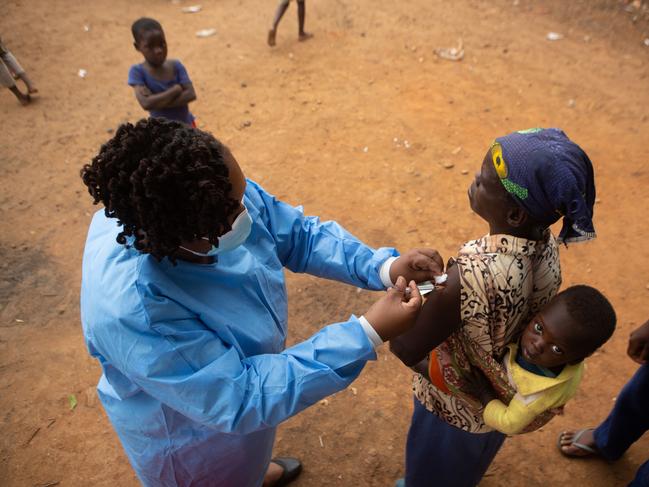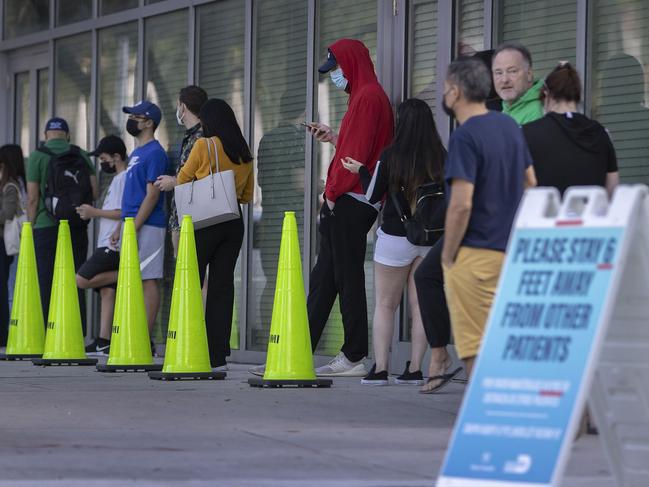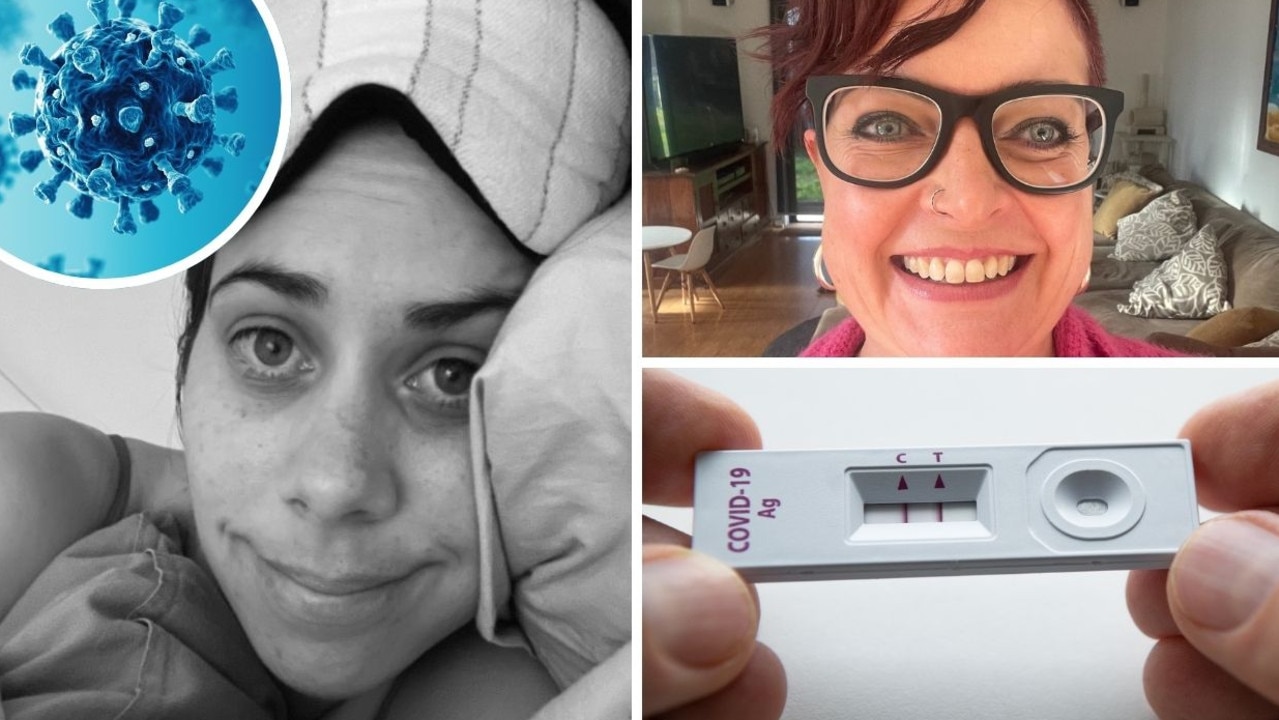Omicron studies show the variant is less severe than Delta as the US lifts its ban on South Africa
The United States will lift its travel ban on eight South African countries after recommendations that Omicron is milder, even as cases surge.
Coronavirus
Don't miss out on the headlines from Coronavirus. Followed categories will be added to My News.
The United States will next week lift the travel ban imposed on several southern African nations when the Omicron variant of Covid was first detected, officials said on Friday.
Countries around the world restricted travel from southern Africa after the variant was detected in South Africa, which reported Omicron to the World Health Organisation (WHO) on November 24.
WHO and the United Nations spoke out against the travel bans, and officials in South Africa said they were being punished for identifying the strain and being transparent.
“The restrictions gave us time to understand Omicron and we know our existing vaccines work against Omicron, esp boosted,” Kevin Munoz, the White House assistant press secretary, said on Twitter.
He said the travel ban would be lifted on December 31.

A senior White House official added that with Omicron present across the United States and globally, international travellers from the eight affected countries would not have a significant impact on US cases.
“During the travel pause President Biden reduced the time for pre-departure testing to one day opposed to three days … travellers from these eight countries will be subject to these same strict protocols,” the official said.
The ban applied to South Africa, Botswana, Zimbabwe, Namibia, Lesotho, Eswatini, Mozambique and Malawi.
Holiday festivities are expected to further drive up Covid cases in the United States where the heavily mutated Omicron variant is pushing some stretched hospitals — and exhausted health workers — to the brink.

Omicron now accounts for more than 90 per cent of all cases in some regions of the country.
The seven-day average of new daily cases is about to pass the Delta peak seen in September, according to non-profit website Covid Act Now.
Intensive care units are running at near-capacity in some states. US health authorities are banking on vaccinations to lower the number of severe Covid cases, and inoculation numbers have been strong all week.
Infection rates are soaring across South Africa as a result of the Omicron variant, but fewer people have died or required hospital treatment compared to previous waves of Covid, local health officials say.
Omicron is known to be far more contagious than previous variants of Covid-19 but appears to cause a less severe illness than its predecessors.
‘LESS SEVERE’: GROUNDBREAKING OMICRON DATA REVEALED
New data about the severity of Omicron has shown it is less likely to see people hospitalised than the Delta variant.
Separate studies from the UK and South Africa have raised hopes the world is not going to be plunged into a similar situation as when Covid-19 first emerged in early 2020 and when vaccines were not available.
The British study from London’s Imperial College shows Omicon cases are 15 per cent less likely to attend hospital, and 40 per cent less likely to be hospitalised for a night or more, compared to Delta.
The researchers stressed the estimated reductions in severity should be balanced against the larger risk of infection with Omicron, due to the reduction in protection provided by both vaccination and natural infection.

Professor Neil Ferguson from Imperial College London said their work showed evidence of a moderate reduction in the risk of hospitalisation.
“However, this appears to be offset by the reduced efficacy of vaccines against infection with the Omicron variant. Given the high transmissibility of the Omicron virus, there remains the potential for health services to face increasing demand if Omicron cases continue to grow at the rate that has been seen in recent weeks,” he said.
What isn’t clear is whether the decreased rate of severe cases seen with Omicron are because of characteristics of the variant, or whether it appears milder because it is coming up against populations with greater immunity – like in England and South Africa – from prior infection and from vaccination.
Penny Ward, a professor of pharmaceutical medicine at King’s College London, who was not involved in the research, said: “This news does not detract from the extraordinary spread of this variant across the population, and the fact that even a small proportion of people needing hospital care for Covid may become a very large number indeed if the community attack rate continues to escalate.”
Another UK study, from University of Edinburgh researchers, suggest Omicron is associated with a two-thirds reduction in the risk of Covid-19 hospitalisation when compared to the Delta variant.
People who are double vaccinated and receive a booster shot are 57 per cent less likely to have Covid-19 symptoms if they get infected, they found.
The South African study, carried out by the country’s National Institute For Communicable Diseases, reported Omicron cases were 80 per cent less likely than Delta cases to be admitted to hospital, after adjusting for various factors including previous infection.
But researchers pointed out the vaccination status in this analysis, and data on prior infections was unreliable. Still, there were early signs the Omicon wave was subsiding in the country it was first detected.
“The drop in new cases nationally combined with the sustained drop in new cases seen here in Gauteng province, which for weeks has been the centre of this wave, indicates that we are past the peak,” Marta Nunes, senior researcher at South Africa’s Vaccines and Infectious Diseases Analytics department, told The Associated Press.
Some health officials in the US and Europe have suggested that because South Africa appears to have experienced a relatively quick and mild wave of Omicron, the variant would do similar there.
But Ms Nunes said that might not be the case.
“Each setting, each country is different. The populations are different. The demographics of the population, the immunity is different in different countries,” she said.
More Coverage
Originally published as Omicron studies show the variant is less severe than Delta as the US lifts its ban on South Africa




